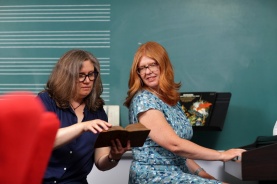Dr. Estelle Joubert
What do you think is the best part of being a musicologist? The best part of being a musicologist is thinking about how music can effect societal change, whether in politics, diplomacy or environmental awareness. 听Studying musicology can help equip us as responsible global citizens, with a nuanced perspective on how sound effects social change.
 听
听
What projects are you currently working on?听 I am currently working on an article on 鈥渄istant readings鈥� in music criticism鈥攖his involves computational methods that 鈥渞ead鈥� thousands of journal articles, displaying broader trends in music criticism that we wouldn鈥檛 be able to 鈥渟ee鈥� without the assistance of computers.听 I鈥檓 also co-editing, with my colleague David R. M. Irving, the Enlightenment volume of a new six-volume cultural history of music.听 We鈥檝e just hosted a SSHRC-funded conference here in Halifax that brought together our chapter contributors to workshop their ideas.听 Many of those musicologists were also professional early music performers, so we enjoyed putting on a free public concert at the Halifax Public Library.听 You can read about the event at
听
What do you like best about living in the City of Halifax?
Halifax is a fabulous place to live.听 From the Arts Centre, you can walk 10 minutes and reach Point Pleasant Park鈥攁 large ocean-side walking area that I frequent several times a week.听 But you can also walk 10 minutes in the other direction and reach downtown Halifax with its fabulous restaurants and night life.听 It really is a walkable city with an unparalleled quality of life.
What areas / topics of research do you specialize in?听 I work primarily on seventeenth- and eighteenth-century music, both famous composers such as Handel and Mozart, but also music of the global enlightenment.听 My methods range from archival work to computational musicology, and I am especially interested in graph database visualization software that showcases how music was disseminated in the early modern period, and how various peoples engaged with sound.
听
Which publication of yours would you describe as your favourite?听 My favourite publication is an article in Cambridge Opera Journal in 2013.听 I set out to find out which composers鈥� operas received the most reviews between 1750 and 1770, and much to my surprise, discovered that it was a woman composer: Maria Antonia Walpurgis of Saxony.听 As the article shows, her operas were to first to receive in-text music examples in music criticism, and this started an entirely new mode of music criticism鈥攐ne that focused sharply on the musical score.
听
Where can we find/read some of your work?
Musicology journals such as Cambridge Opera Journal, Eighteenth-Century Music, Music & Letters, Plainsong and Medieval Music; but also various edited books such as the Cambridge Companion to Eighteenth-Century Opera, Cambridge Companion to The Magic Flute, Studies in Global Music History, and others.
What advice can you offer any interested musicology students?听
I would look not only for a great supervisor.听 Try to also find a place where you can be part of a research team and can gain important skills, especially technical skills such as data manipulation, coding, project management and so forth.听 Being part of a research team will give you a sense of community, will enable you to contribute meaningfully to a scholarly project right from the start, and it also gives you indispensable skills that make you highly employable.

